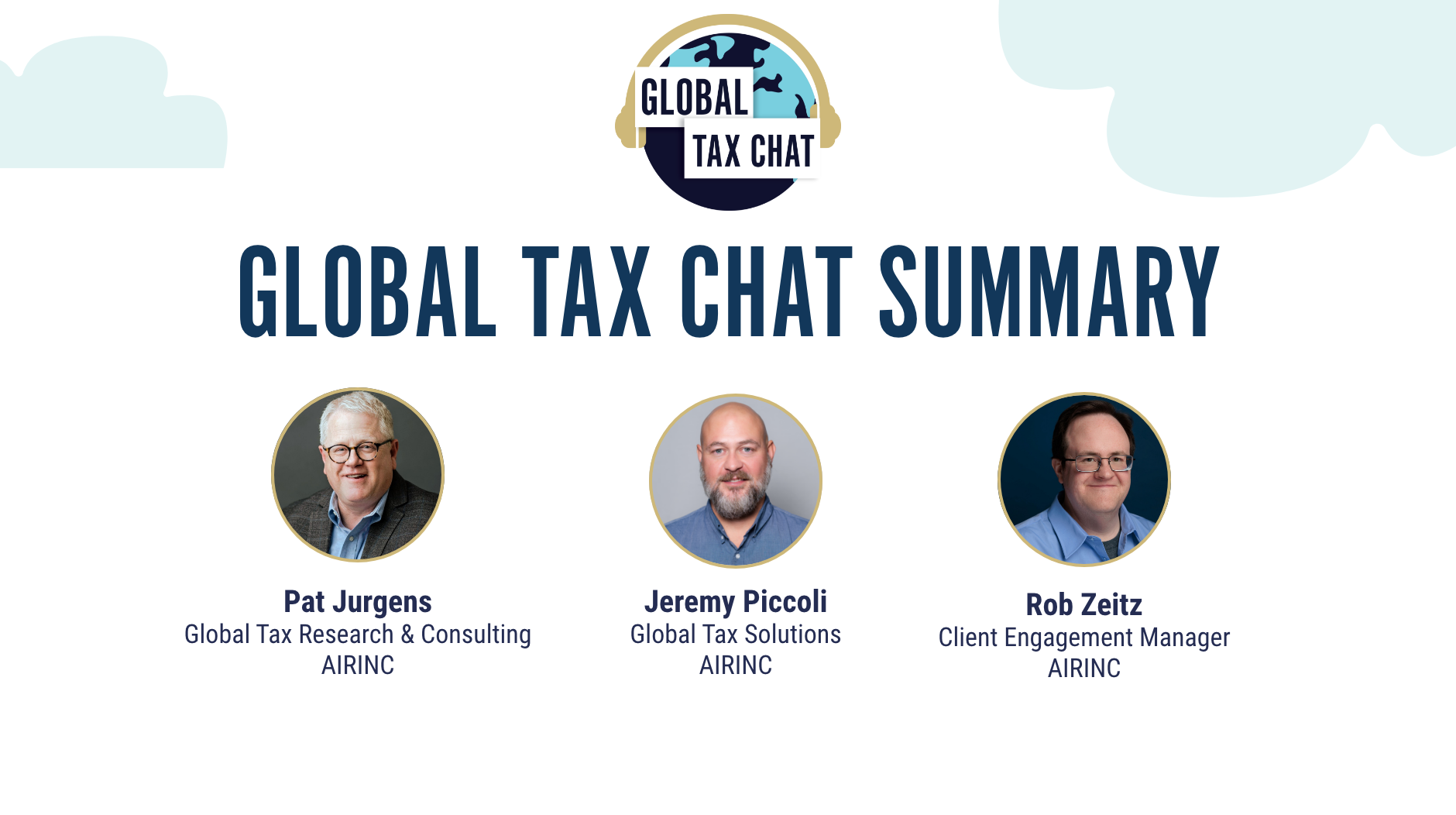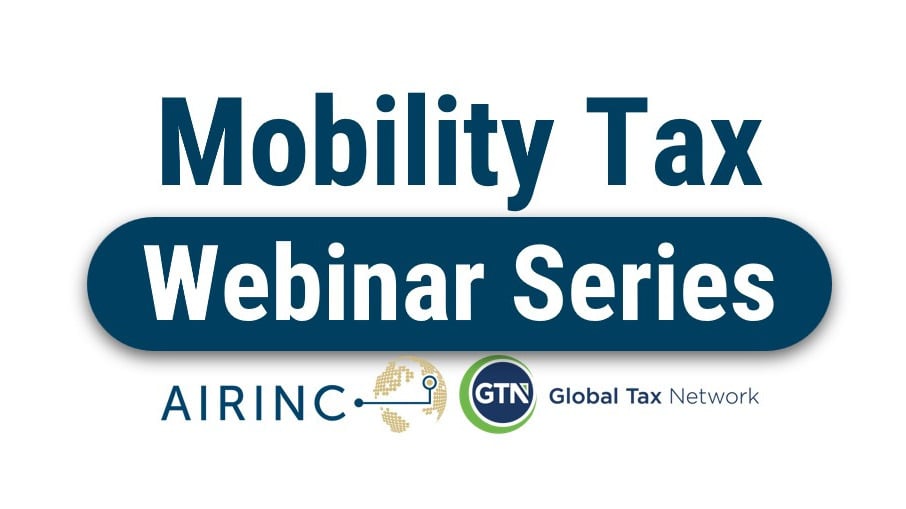During AIRINC’s 6th Global Tax Chat, we covered the latest mobility tax developments on topics AIRINC has been following recently.
If you didn’t get a chance to watch our show live, you can watch the recording by clicking on the link below.
We explored the following topics:
- Tax Developments for Australia Superannuation
- Lithuania proposes new Expatriate Tax Concession for learning Lithuanian language
- How significant are tax costs?
- Tax consequences for virtual assignments, business travel, remote work, work from anywhere, work-cations?
Tax Developments for Australia Superannuation
Pat recently shared a comprehensive blog post on the tax changes for Australia Superannuation - see here. The blog post provides a summary of the changes to the Superannuation scheme coming into effect July 2024, July 2025, and July 2026, as well as a detailed synopsis of how the scheme operates.
Lithuania proposes new Expatriate Tax Concession for learning Lithuanian language
The parliament in Lithuania has proposed an amendment that would come into effect for 2025 and would provide preferential tax rates to foreign nationals who successfully complete the Lithuanian state language exam. The amendment is intended to integrate foreigners into Lithuanian culture and society, as well as encourage a widening adoption of the Lithuanian language. Qualifying individuals would see progressive tax rates on employment income reduced from 20% and 32% to 15% and 28%, respectively.
How Significant are Tax Costs?
Taxes are often the most expensive single cost of an international move. In many instances, allowances provided to the employee are considered a taxable benefit, depending on the type of allowance and the delivery mechanism (benefit-in-kind, cash allowance, direct reimbursement). Compound this cost, when an employer covers the tax on behalf of the employee (which is typically practiced in most assignment types), the taxes paid are also a taxable benefit, creating a ‘tax-on-‘tax’, or ‘gross-up’ calculation. For example, if a company were to provide a taxable Home Sale Assistance allowance of $10,000 and the effective tax rate was 40%, the gross allowance would need to be $16,667 in order to net the $10,000 amount. This implies a gross-up tax rate of 66.67%. Now extrapolate that cost impact across an entire package of allowances, and across an entire assignee population, the tax costs increase rapidly.
The other complicating factor with respect to taxes is that they are compulsory, governed and enforced by the tax authorities of the countries companies operate in. Tax authorities have the ability to enforce the withholding and/or payment of tax liabilities, as well as assess interest and penalties on unpaid or past-due amounts. Whereas global mobility programs have control and flexibility in designing and providing allowances, they do not have the ability to manage tax liabilities, aside from proper legal tax planning. Tax authorities also have the ability to coordinate with immigration services to limit or exclude non-compliant employees and employers.
During our webinar we asked our audience which types of assignment they ran cost estimates for?
- For Long-Term Assignments Only = 9%
- All assignments = 71%
- A few kinds of assignments but not all = 12%
- Only when requested by the business = 8%
- Never = 0%
Tax consequences for virtual assignments, business travel, remote work, work from anywhere, work-cations...
The meteoric rise in remote work as a result of the pandemic has spawned new types of working situations that traditionally wouldn’t fall under global mobility’s purview. However, as these employees start working across borders, their impact should be tracked in order to avoid unexpected tax consequences. Each tax jurisdiction sets its own rules in terms of days and/or income thresholds for when an individual may become taxable. An employee could technically be taxable from Day 1 or Dollar 1, or there may be more reasonable thresholds that provide for normal short-term business trips (15 – 60 days). It’s important to understand the rules in place and manage the company’s risk tolerance. Indeed, it may be prudent to establish locations that are allowed, not allowed, or need further investigation in order to protect the company from permanent establishment issues, or unexpected tax costs.
It's important to remember that the so-called ‘183-day’ rule is not actually a global rule, but a fallacy borne from in-force income tax treaties. For expatriates on short-term assignments or business trips, tax preparers are most commonly utilizing the Dependent Personal Services article of the treaty. This article stipulates that an individual cannot spend more than 183 days in the Host location (typically on a rolling 12-month basis). It also requires that the compensation is not paid or borne by the Host location. While there are hundreds of in-force income tax treaties, not every country combination has ratified them.
Another important distinction is that income taxes and social security are two separate tax beasts, governed by different rules and agreements. Tax treaties only cover income tax, whereas Totalization Agreements cover social security and there are far fewer totalization agreements in force than income tax treaties. Circumstances often arise where an individual is exempt from tax, but still technically obligated to contribute to social security in the Host location.
And, finally, utilizing in-force agreements (income tax treaties and totalization agreements) is not automatically granted, there’s often paperwork or filings that need to be completed and documented to ensure proper compliance.
Conclusion
Thank you to the audience for joining us. Stay tuned to the blog for the details of the next Global Tax Chat show & all the latest tax update (why not subscribe?). Until then, goodbye, and safe travels in the world of global mobility!




%20(33).png)

%20-%202026-02-04T222549.716%20(1).png)

